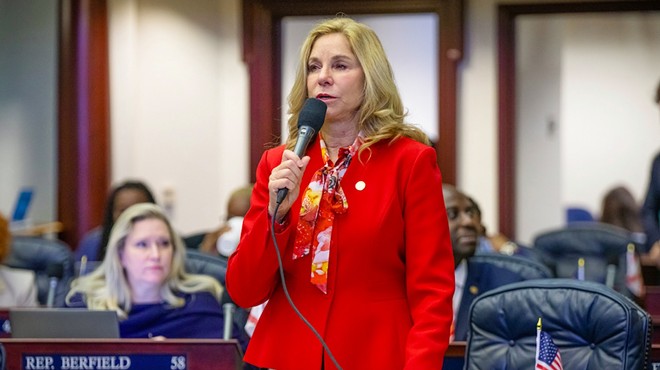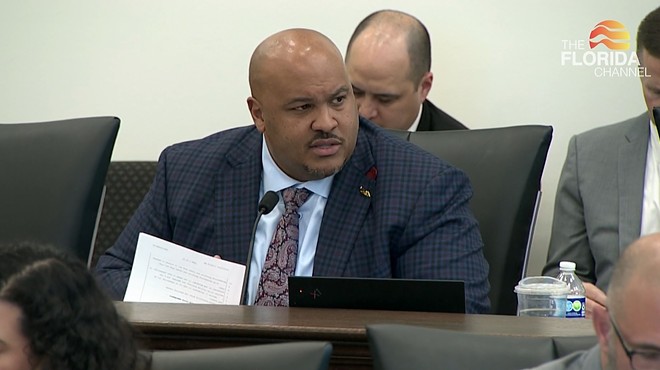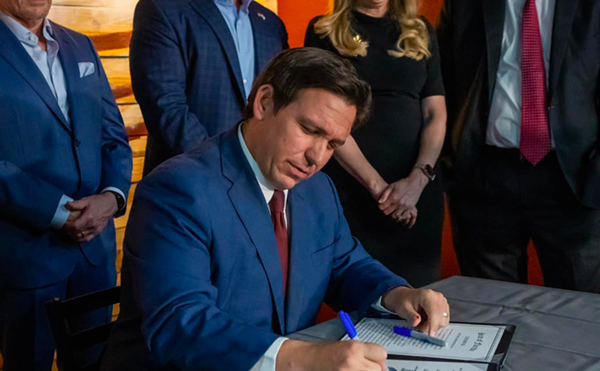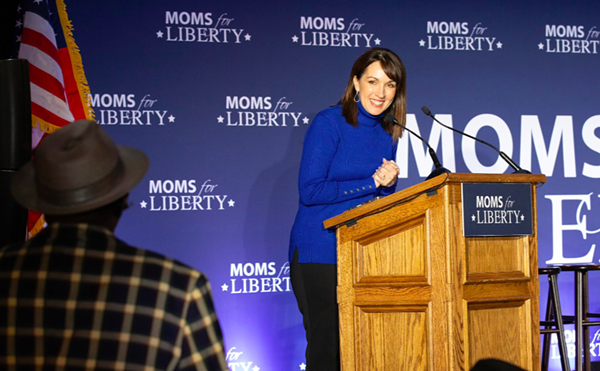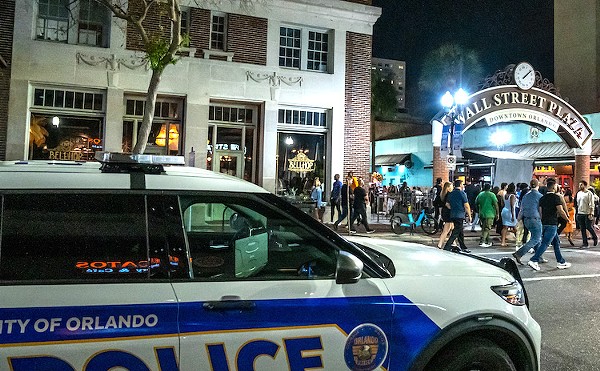The Senate Rules committee voted 15–3 Monday night to advance House Bill 49, as amended, with Democratic senators Shevrin Jones, Vic Torres and Lauren Book in opposition.
The bill, now headed to the full Senate, already secured approval from the Florida House earlier this month in a 80–35 vote largely along party lines.
The proposal — backed by lobbying groups for the retail, restaurant and tourism industries — has been met with a flood of pushback from organized labor and social advocacy organizations, teachers, and parent groups like the Parent Teachers Association (PTA).
Child labor violations found in Florida and the country more broadly have soared in recent years, leaving critics to ask why the state is seeking to weaken the protections for minors that already exist. Republican state Sen. Danny Burgess, a father of three young children who carried the bill in the state Senate (SB 1596), says the aim is to offer greater “flexibility” in teen labor through “measured adjustments.”
“This is in no way, shape or form a repeal of current Florida law,” said Burgess, who's been amenable to making minor changes (no pun intended) over the course of the legislative process. “It's merely updating it.”
Florida House Bill 49, filed by St. Pete Beach Republican Linda Chaney in the state House, originally sought to allow teenagers 16 and older to work overnight shifts and over 30 hours per week during the school year — which is currently barred under law.
The bill also sought to remove teens 16 and older from a requirement under current law that minors be granted 30-minute breaks every four hours on the job.
Burgess filed a companion bill (SB 1596) in the state Senate, months after Chaney, that was already a bit watered down from Chaney’s version. Both have amended the legislation since to scale it back.
The newly revamped version, amended by Burgess, clarifies that:
Minors 16 and older cannot work more than 30 hours per week during the school year, unless they get a parent or school superintendent to sign a waiver issued by the state Department of Business and Professional Regulation to provide to the employer. (Child labor waivers are already available for minors under current law.)
Minors 16 and older are still required to get 30-minute breaks every four hours if they are working a shift of at least eight hours.
Minors 16 and older may not work more than eight hours in one day during the school year, unless they’re working on a holiday or a Sunday. (No kid is actually paying attention in school on Mondays, right?)
-
Minors 16 and older may not work before 6:30 a.m. or after 11 p.m. if they have school the next day.
Minors younger than 16 are largely not affected by the proposed legislation, which would be effective July 1, if approved by the majority of the state Legislature and Gov. DeSantis.
One of the things the bill would do, if passed, is allow employers to work teens 16 and older work more than six consecutive days per week.
Alexis Tsoukalas, a policy analyst for the nonpartisan Florida Policy Institute who's consistently been critical of the legislation, told lawmakers she was “disappointed” by this proposed change. “Six days is a lot for an adult to commit to, let alone youth who are also juggling school demands,” she said during public testimony.
The bill would also add an exemption from child labor law for minors 16 and up who are home-schooled or enrolled in an approved virtual school program.
Burgess, whose own children are home-schooled, said he believes it’s important to update current law to offer greater flexibility for children outside of traditional school programming.
“I think this is a reflection of how there's a lot more flexibility in time, there's a lot more choice,” he said during Monday’s committee hearing.
Tsoukalas, however, expressed concerns about the new exemption.
“Letting this group of teens work during traditional school hours is one thing, given the differing hours they can study or attend class — but letting employers schedule them for unlimited hours, overnight, and without breaks is quite another.”
Research has found that putting minors to work for more than 20 hours per week can negatively affect things like academic performance and increase the risk of behavioral problems like drug use or skipping school.
Absenteeism is already a problem. According to data from the Florida Department of Education, about 31% of the 3.2 million students enrolled in Florida’s public school system were absent 10% or more of the time during the 2022-2023 school year.
But some former critics of the legislation, including Dr. Rich Templin with the Florida AFL-CIO, felt satisfied with Burgess' changes.
“When we look at the product as it came over from the House, with truly draconian elimination of labor laws that have been on the books since 1986, this is an area where we have to break with tradition,” said Templin. “And we support this bill.”
The Florida AFL-CIO is the state’s largest labor federation, made up of over 500 local union affiliates and over 1 million union members and retirees.
‘This is in no way, shape or form a repeal of current Florida law,’ said Burgess. ‘It’s merely updating it.’
tweet this
Florida’s child labor laws date back to the early 20th century. However, they've been amended several times over the years to address inequities in industry carve-outs and to establish certain protections for minors that are stronger than federal standards — for instance, restrictions on work hours for minors 16 and older.
“I think that this legislation is an effort to — not roll back to the federal standard — but to recognize that the world has changed and we've adapted and this is a reflection of that,” Burgess told his colleagues Monday.
House bill sponsor Linda Chaney, who's gotten flak for refusing to call some minors "children," has argued that teens “want to work.” Florida’s workforce, the third-largest in the country, already includes tens of thousands of minors.
Current law allows teens 14 and older to work a number of jobs legally, with a process already in place for them to seek waivers through the Florida Department of Business and Regulation, which regulates child labor law, and the Department of Education. Current law also exempts children working in the entertainment industry, children employed by their parents, children who are or who have been married, and children who work as babysitters or who do other domestic work in homes.
More teens nationwide are joining the workforce, according to the Washington Post, with some citing reasons like financial independence, the chance to learn new skills, and pressure to help pitch in for household expense as motives for pursuing work.
But there’s no illusion as to where the bill came from. And it wasn’t from teens traveling to the bill sponsors’ offices, begging for more “flexibility” in work hours.
Communications obtained by Orlando Weekly through a public records request show a lobbyist for the Opportunity Solutions Project — a lobbying arm of the right-wing Foundation for Government Accountability — emailed draft legislation to Chaney, the House bill sponsor, in August.
Anita Berry, lobbying on behalf of the Opportunity Solutions Project, floated Burgess as a potential Senate bill sponsor at the time in a text message to Chaney’s legislative aide, Tristan Sommer. In early October, Berry confirmed over text that Burgess was in.
“Yes, he has it in drafting and I am meeting with him on Tuesday,” Berry wrote over text.
Email communications obtained by Seeking Rents, shared with Orlando Weekly, also show Burgess communicating with the Foundation for Government Accountability directly in early October.
The FGA, founded in 2011, is also lobbying for proposals this session that would make it harder for Floridians to obtain unemployment benefits, and forbid local governments from requiring their contractors to pay employees a living wage. They're known for supporting policies designed to undermine the social safety net and to establish additional barriers to securing government assistance.
But the FGA — a group that has a close relationship with Gov. Ron DeSantis — isn’t acting alone. Since the bills were filed, the Florida Restaurant and Lodging Association (a lobbying group for employers in Florida’s restaurant and tourism industries) has been one of the legislation’s biggest cheerleaders.
Samantha Padgett, a lobbyist for the group who waived in support of the legislation Monday night, told a committee of state representatives in December that the proposal had been met with a “flood of positive support” from their members.
“The current regulations are overly restrictive and can be challenging to manage,” said Padgett, speaking on feedback she'd received from Florida restaurant and hotel owners. “Additional staffing,” she added, “is desperately needed.”
The Florida Retail Federation and other industry lobbying groups have similarly been keeping tabs on the legislation, according to disclosure reports filed with the Florida House.
Sen. Shevrin Jones, a South Florida Democrat, asked Burgess Monday if he had any concern about the state’s ability to enforce child labor laws as it is. According to the Department of Business and Professional Regulation, they have just seven enforcement personnel in the state for child labor regulation, covering thousands of Florida businesses.
These personnel conduct walk-in site visits year-round at establishments that employ minors, a spokesperson told us, to “ensure they are not working in hazardous occupations and that employers are adhering to proper work hours and break times for minors.”
The agency also investigates complaints they receive directly — which totaled 257 in the 2022-23 fiscal year, up from 220 in fiscal year 2019-2020.
Just 30 of those cases from Oct. 1, 2019, to Sept. 30, 2020, resulted in fines for the employer, the agency spokesperson confirmed, while just five did last fiscal year.
The federal Department of Labor similarly has wage and hour investigators in Florida, but they’re in limited supply, too. Furthermore, those investigators don’t focus only on child labor standards, but also enforcement of minimum wage and overtime protections (something Florida doesn’t do itself).
From 2019 to 2022, child labor violations identified by the feds in Florida nearly tripled, from 95 in 2019 to 281 in 2022. And that’s just representative of violations that were found and fully investigated. With the federal department’s limited enforcement capacity, investigators may not be able to take on every case.
Burgess, for his part, told Jones he doesn’t believe the state “will have any issue” in pursuing violations.
“[We] certainly can have those discussions and look and see if there's anything else we need to do going forward,” he said.
With Monday’s vote, the legislation will now head to the full, Republican-dominated Senate for a vote, where it is likely to pass. Another industry-backed set of bills targeting Florida's child labor laws on construction sites (SB 460/HB 917) is similarly advancing with bipartisan support.
Follow us: Apple News | Google News | NewsBreak | Reddit | Instagram | Facebook | Twitter | or sign up for our RSS Feed


